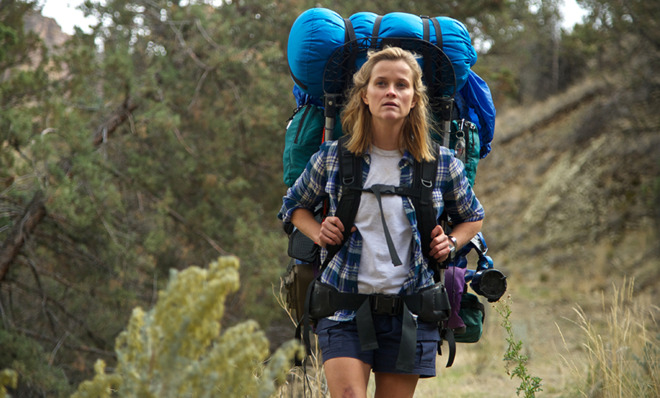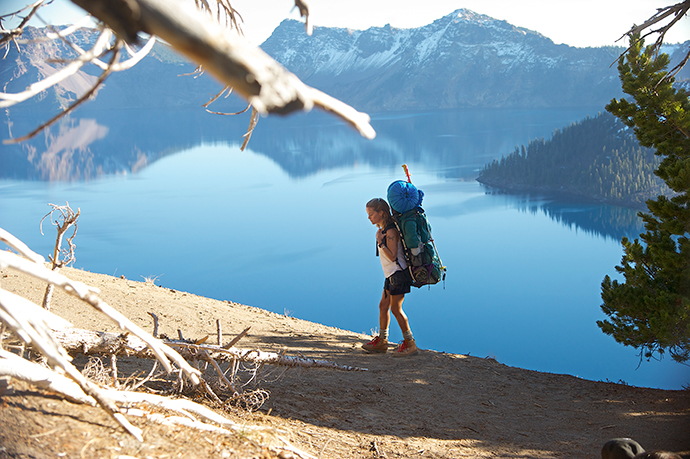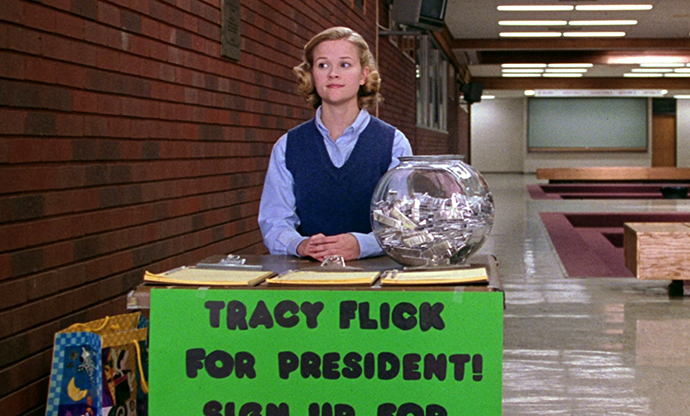Girls on Film: How Wild's Reese Witherspoon finally got a film worthy of her talents
The adaptation of Cheryl Strayed's bestselling memoir is Witherspoon's juiciest role in 15 years


A free daily email with the biggest news stories of the day – and the best features from TheWeek.com
You are now subscribed
Your newsletter sign-up was successful
"If there's one thing I can teach you, it's how to find your best self." -Laura Dern, Wild
In Wild, Reese Witherspoon stars as Cheryl Strayed — a woman who set off on a solo, 1,100-mile hike on the Pacific Crest Trail to reshape herself "back to the woman my mother thought I was." Wild is based on a real-life story, but it also feels destined for Witherspoon. For the first time in years, Witherspoon is given the chance to overcome the banal Hollywood box she's been placed into and return to the dynamically complex characters of her youth.
Wild goes far beyond the usual soul-searching artifice Hollywood offers women. There is no quest for delicacy, and no wealth that makes any whim possible. There are no conveniently placed people to show her love and fix her damaged psyche. There is no "harrowing" environment that's only harrowing because it offers minimally less privilege than the one she normally occupies.
The Week
Escape your echo chamber. Get the facts behind the news, plus analysis from multiple perspectives.

Sign up for The Week's Free Newsletters
From our morning news briefing to a weekly Good News Newsletter, get the best of The Week delivered directly to your inbox.
From our morning news briefing to a weekly Good News Newsletter, get the best of The Week delivered directly to your inbox.

As Wild begins, Witherspoon's Cheryl sits in a cheap motel room amid a massive pile of camping gear and the little money she has left. She's jumping feet first into the unknown, with a pack so massive she can't lift it. She is leaving everything she knows and heading out alone into the wilderness to push her body, mind, and spirit into her "best self." Pamphlets teach her the basic skills she needs to survive; her wits must protect her from everything else.
The harsh environment is only part of Cheryl's battle. She rarely comes across humans, and when she does, they are almost universally men. From the kindest to the most sinister, there's an eerie similarity through all of their interactions. They appraise her, note her slightness, and compliment her beauty. Wild begins to feel like a horror movie, as Cheryl is repeatedly forced to judge their actions and assess her safety.
Nothing stops her. Each step in the wilderness brings Cheryl deeper into the problems she's struggling to resolve — the swift and early death of her mother, her subsequent descent into drugs and promiscuity, and the dissolution of her marriage. Witherspoon's Cheryl isn't a mawkish heroine who speaks in clichés and boasts a personality with blandly smooth edges. She cries and frets and throws a middle finger in the air, and then continues on her way. She is a striking mix of human contradictions — of weakness and strength, innocence and savvy, introspection and denial. Humor and defiance always linger on the edge of her darkness.
To those with short memories, the character might seem entirely atypical for Witherspoon, who is widely admired as "Hollywood's wholesome, sharp-tongued heroine." But to those who remember the beginning of her career, the actress is finally getting back to the wicked depth and strength that made her a breakout star.
A free daily email with the biggest news stories of the day – and the best features from TheWeek.com
Two years before 1995, when the real-life Cheryl Strayed set off on her journey along the Pacific Crest Trail, Witherspoon was playing Nonnie Parker in A Far Off Place — a girl forced to take a 2,000-kilometer journey through the African desert to escape poachers who murdered her family. In her earliest roles, Witherspoon avoided the typically light teen fare and in favor of danger, turmoil, and burgeoning sexuality.
At 18, she embraced the dark, acerbic roles that defined the '90s and gave her the freedom to embrace her wicked edge. Alongside Stephen Dorff she played a hostage-turned-media phenomenon in S.F.W.; riffed on Little Red Riding Hood by playing an abused runaway hunted by a serial killer in Freeway; and struggled against a violent lover in Fear.

Witherspoon danced on the precipice of decorum and defiance. Whether she was the sexually free and outspoken paramour of Paul Rudd in Overnight Delivery or the seemingly innocent object of a bet in Cruel Intentions, she cleverly played with expectation and darkness — no more keenly than in her truly electric role as Tracy Flick in Election, a fierce intellectual with an even fiercer opinion on justice.
Of course, as many Hollywood stories go, the studio system didn't know what to do with a powerful, 20-something actress on the brink of stardom — especially a petite blonde with a very particular mixture of femininity and strength. Witherspoon's decade of female rebellion was all but forgotten in the new millennium, leading her into Legally Blonde, which got her pigeon-holed as the It Girl of mainstream romance.
Despite the Oscar she won as Walk the Line's June Carter Cash, the decent film roles disappeared. In the five years after her biggest critical success, Witherspoon worked on only four live-action films: three terribly received movies (Rendition, Four Christmases, How Do You Know), and one passion project that sat on the shelf for years after its production (Penelope). Witherspoon's fierce origins had been replaced with the typical Hollywood story of a rising star caught in a quagmire of useless roles.
Remarkably, Wild is the first film in 15 years that has allowed Witherspoon to do what she does best: headline a film as a dynamically strong, real, and captivating woman. Her work in Wild is terrific, but it isn't new territory; it's the return of a talent that's been underutilized for far too long.
How did it happen? Wild is not, unfortunately, the result of some Hollywood executive finally brushing away the cobwebs and remembering the talent Witherspoon once got to showcase. It's Witherspoon taking the reins for herself. She had to personally option Strayed's bestselling memoir.
By now, this all feels repetitive; a film like Wild comes along and shakes the status quo, and we wait to see whether Hollywood is jolted into new terrain, or stubbornly sticks to its well-worn path. It's a system under which even a talent as impressive as Reese Witherspoon can be left floundering for 15 years. But as long as Witherspoon has a hand in her fate, and offers films like Wild, there's at least one powerhouse who can challenge "Mr. Popular."

Girls on Film is a weekly column focusing on women and cinema. It can be found at TheWeek.com every Friday morning. And be sure to follow the Girls on Film Twitter feed for additional femme-con.
Monika Bartyzel is a freelance writer and creator of Girls on Film, a weekly look at femme-centric film news and concerns, now appearing at TheWeek.com. Her work has been published on sites including The Atlantic, Movies.com, Moviefone, Collider, and the now-defunct Cinematical, where she was a lead writer and assignment editor.
-
 The ‘ravenous’ demand for Cornish minerals
The ‘ravenous’ demand for Cornish mineralsUnder the Radar Growing need for critical minerals to power tech has intensified ‘appetite’ for lithium, which could be a ‘huge boon’ for local economy
-
 Why are election experts taking Trump’s midterm threats seriously?
Why are election experts taking Trump’s midterm threats seriously?IN THE SPOTLIGHT As the president muses about polling place deployments and a centralized electoral system aimed at one-party control, lawmakers are taking this administration at its word
-
 ‘Restaurateurs have become millionaires’
‘Restaurateurs have become millionaires’Instant Opinion Opinion, comment and editorials of the day
